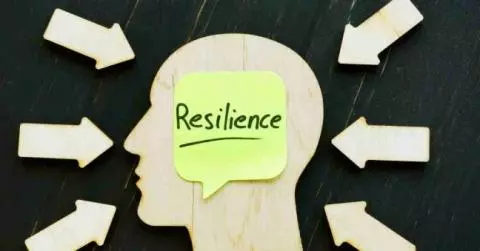As humans, life always presents us with adversities and challenges such as illnesses, the demise of a loved one, financial difficulties, problematic relationships, abuse, loss of one’s job, a fatal accident, and other difficulties that cause us a lot of stress. The experience of these challenges stirs up different kinds of thoughts, feelings, and reactions from people. Despise the intensity of life challenges people seem to bounce back and have a thrilling life afterward. This in part could be explained by a survival skill known as resilience.
What is Resilience?
According to American Psychological Association, resilience can be defined as “the process of adapting well in the face of adversity, trauma, tragedy, threats, or significant sources of stress—such as family and relationship problems, serious health problems, or workplace and financial stressors”. Resilience is one’s ability to recover from challenging situations that life presents to you. This means resilience can only be expressed in the face of stressful situations and not in the absence of them. To be resilient means you are able to live through life’s stresses and grow to be who you are meant to be.
Resilience plays an important role in one’s mental health as it acts as a protector from the impacts of stressful events. Studies have demonstrated this. For example, a particular study indicated a negative correlation between resilience and mental disorders like anxiety and depression. The study further found resilience to be associated with health-promoting behavior and quality of life. Furthermore, a study has also underscored the role of resilience in managing chronic illness. Another study reported better quality of life of patients with high/moderate levels of resilience than those with low levels of resilience. Resilience is therefore essential to managing life’s difficulties. Amplifying this, Dr. Sood Amit, a former professor of medicine and an expert in the field of mental health, stated that “resilience is the core strength you use to lift the load of life”.
How to Build Resilience
Some people may indeed be more resilient than others. However, resilience is like every other skill that can be learned and developed over time (American Psychological Association, 2020). Below are some of the ways you can develop your level of resilience to life challenges.
Connect with others – the role of social support in building resilience can never be overstressed. Bonding with others is one of the very important ways to build your resilience in the face of life’s downturns. In connecting with others, ensure you stay around people that truly understand you and can support you build your esteem. The “others” here could be a friend or some community-based group. Don’t be a loner.
Maintain a healthy body – another effective step to building your resilience is to take care of your body. This is particularly important because there is a link between your body and your mind. What affects your body can affect your mind. You take care of your body by keeping to a healthy diet and staying hydrated, doing proper exercise, and maintaining sleep hygiene. All these help your body to adjust to life stresses and reduce their effects on your mind.
Engage in mindfulness – activities like yoga, prayer, journaling, and meditation on the good things in your life help to build your resilience.
Be helpful to others – one of the core components of resilience is finding purpose, and this can be achieved by rendering assistance to others in need. Offering little assistance to those in need around you could improve your self-esteem and boost your level of resilience.
Set a goal and work towards it – decide exactly what you want at a particular time, ask yourself regularly what need you need to do, no matter how little it may be that could move you toward the realization of your goal. If that has been decided, put it into action immediately. Don’t delay.
Perspective is key – evaluate your thinking pattern. Get rid of distorted thought patterns by replacing them with logical ones. Do not overgeneralize problems to mean an end of the road for you. Rather recognize that challenges no matter the types are part of life and that you will have to learn to manage them.
Keep an open mind – learn to be flexible. Accept situations that are beyond your control and adjust to them. You might not be able to change every circumstance that may come your way but you can adjust to it.
Be optimistic – resilience can be built by having a positive expectation about the outcome of your life. Instead of focusing your energy on the negative outcomes, channel that energy into positive ones.
Don’t forget the previous lesson – cast your mind back to previous victories over stressful situations. Think of how you managed them and through that you may find ways to manage the present ones.
Seek the service of mental health experts – sometimes, the trouble could be so overwhelming that you don’t know what to do or who to turn to. At such times, reaching out to mental health experts would be the best option. In the events where you run out of options, the Institute of Counseling in Nigeria is willing and available to help. You can reach us via www.instituteofcounseling.org or call our 24/7 hotline at +2348188783527
The hurtful experience of life’s stressors doesn’t have to determine the course of your life. It is possible to adjust, change, and grow in many aspects of your life. This is why resilience is important. Resilience, therefore, helps you rise above difficulties, enables you to grow and be better off.

